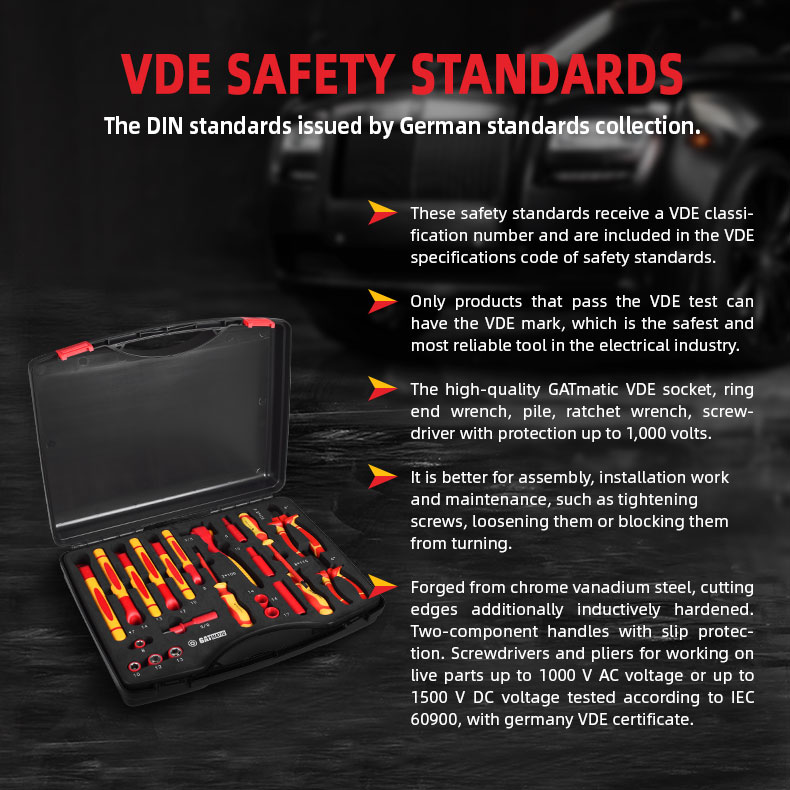Voltage Mastery: A Closer Look at AC 1000V Insulated Tool Kits Following VDE Standards
Voltage mastery is paramount in the field of electrical work, where safety is not just a priority but a necessity. As professionals navigate high-voltage environments, the risk of accidents looms large. However, with the advent of AC 1000V insulated tool kits adhering to VDE standards, a new era of safety and precision has dawned. This essay delves into the significance of voltage mastery, the features of AC 1000V insulated tool kits, and the importance of VDE standards in ensuring safety.
I. Understanding Voltage Mastery
Voltage mastery encompasses the knowledge, skills, and tools required to safely work with high voltage. The stakes are high in electrical work, with potential risks including electrocution, fires, and equipment damage. Therefore, proficiency in voltage safety is indispensable. Insulated tools play a crucial role in mitigating these risks by providing a barrier between the user and the electrical current.
II. AC 1000V Insulated Tool Kits
AC 1000V insulated tool kits are specially designed to meet the demands of high-voltage environments. These kits typically include a range of tools such as screwdrivers, pliers, and wrenches, all insulated to withstand up to 1000 volts. The insulation serves as a protective layer, preventing electrical conductivity and ensuring the safety of the user. Moreover, these tools are rigorously tested and certified to comply with VDE standards, guaranteeing their reliability and effectiveness.
III. VDE Standards for Insulated Tools
The Verband der Elektrotechnik, Elektronik und Informationstechnik (VDE) sets the benchmark for safety in electrical engineering. VDE standards outline the requirements for insulated tools, ensuring they meet strict criteria for insulation integrity, mechanical strength, and durability. By adhering to VDE standards, manufacturers certify that their tools are fit for use in high-voltage environments, providing users with peace of mind and assurance of safety.
IV. Selection and Proper Use of Insulated Tools
Selecting the right insulated tools is paramount to ensuring safety in electrical work. Factors such as voltage rating, insulation material, and ergonomic design should be considered when choosing tools for a specific task. Additionally, proper usage techniques, maintenance, and regular inspection are essential to prolonging the lifespan of insulated tools and maximizing their safety benefits.
V. Training and Certification
Proficiency in voltage safety requires comprehensive training and certification. Employers play a pivotal role in providing employees with the necessary training to handle high-voltage environments safely. Certification programs ensure that workers are equipped with the knowledge and skills to use insulated tools effectively and adhere to safety protocols. Ongoing education and updates on safety standards are also essential to staying abreast of industry best practices.
VI. Case Studies and Examples
Real-life examples underscore the importance of voltage mastery and the use of insulated tools. Accidents resulting from improper tool usage highlight the dire consequences of neglecting safety protocols. Conversely, success stories demonstrate the efficacy of AC 1000V insulated tool kits in preventing accidents and ensuring the safety of workers. These case studies serve as valuable lessons, emphasizing the need for strict adherence to safety standards in electrical work.
VII. Future Trends and Innovations
The future of voltage mastery holds promising trends and innovations aimed at enhancing safety and efficiency in electrical work. Emerging technologies such as smart insulation materials and augmented reality tools offer new avenues for improving workplace safety. Additionally, advancements in automation and robotics have the potential to revolutionize the way high-voltage tasks are performed, further reducing the risk to workers.
Conclusion
In conclusion, voltage mastery is imperative in ensuring safety in electrical work. AC 1000V insulated tool kits following VDE standards represent a significant advancement in this regard, providing users with reliable and effective tools for high-voltage environments. By adhering to VDE standards, selecting the right tools, and investing in comprehensive training, professionals can mitigate risks and uphold the highest standards of safety in electrical engineering. As we embrace future trends and innovations, the quest for voltage mastery continues, driving us towards a safer and more efficient future in electrical work.
FAQs
1. What is voltage mastery, and why is it important in electrical work?
Voltage mastery refers to the expertise and understanding required to safely work with different voltage levels in electrical systems. It is crucial because working with high voltages poses significant risks to personnel and equipment. Proper training and tools are essential to prevent accidents and ensure the safety of workers.
2. What are AC 1000V insulated tool kits, and how do they differ from regular tool kits?
AC 1000V insulated tool kits are specialized sets of tools designed for use in environments where voltages up to 1000 volts AC are present. These kits contain insulated tools that provide an extra layer of protection against electrical shock. Unlike regular tool kits, insulated tool kits meet specific safety standards, such as those set by VDE, to ensure the highest level of protection for workers.
3. What are VDE standards, and why are they important for insulated tools?
VDE standards are a set of regulations and guidelines established by the Association for Electrical, Electronic & Information Technologies in Germany. These standards define the requirements for electrical safety and performance of various products, including insulated tools. Adhering to VDE standards ensures that insulated tools meet stringent safety criteria, providing users with confidence in their reliability and effectiveness.
4. How do AC 1000V insulated tool kits enhance safety in electrical work?
5. AC 1000V insulated tool kits enhance safety by minimizing the risk of electrical shock when working in high-voltage environments. The tools in these kits are designed with insulated handles or shafts, preventing direct contact with live electrical components. Additionally, the tools undergo rigorous testing and certification processes to ensure they meet VDE standards for electrical safety.
5. What factors should be considered when selecting insulated tools for electrical work?
When selecting insulated tools, it is essential to consider factors such as voltage rating, tool quality, ergonomic design, and compliance with safety standards. Additionally, users should ensure that the tools are suitable for the specific tasks and environments they will be used in, and that they undergo regular inspection and testing to maintain their effectiveness.
6. Is training required for using AC 1000V insulated tool kits, and if so, what does it entail?
Yes, training is essential for safely using AC 1000V insulated tool kits. Training typically covers topics such as electrical safety, proper tool usage techniques, maintenance procedures, and emergency response protocols. Employers are responsible for providing comprehensive training to their workers and ensuring that they have the necessary skills and knowledge to work safely with insulated tools.
Describe Your Needs In Detail!
We will carefully evaluate your needs and give professional solutions.



